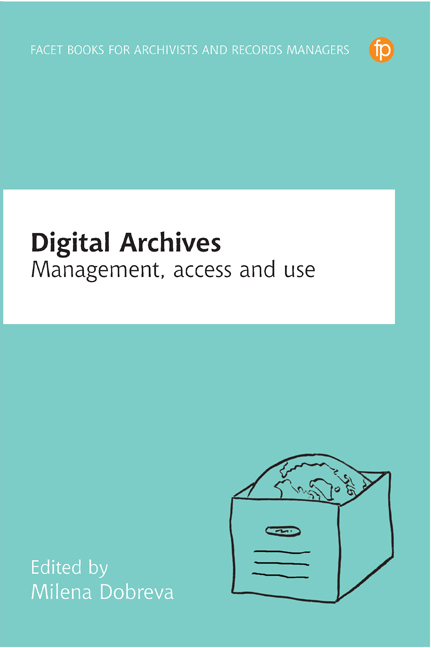Book contents
- Frontmatter
- Dedication
- Contents
- List of Figures and Tables
- Abbreviations
- Foreword
- Preface: Digital archives: management, use and access participatory approaches in archives
- Acknowledgements
- Notes on contributors
- PART I DRIVERS FOR MODERN DIGITAL ARCHIVES
- PART II CASE STUDIES
- 7 Research data archives: current data management and data audit practices
- 8 Access restrictions
- 9 Citizen science: two case studies in oral history research
- Afterword
- Index
7 - Research data archives: current data management and data audit practices
from PART II - CASE STUDIES
Published online by Cambridge University Press: 02 October 2019
- Frontmatter
- Dedication
- Contents
- List of Figures and Tables
- Abbreviations
- Foreword
- Preface: Digital archives: management, use and access participatory approaches in archives
- Acknowledgements
- Notes on contributors
- PART I DRIVERS FOR MODERN DIGITAL ARCHIVES
- PART II CASE STUDIES
- 7 Research data archives: current data management and data audit practices
- 8 Access restrictions
- 9 Citizen science: two case studies in oral history research
- Afterword
- Index
Summary
Introduction
In the last decades, archives have been developed in order to preserve organisational and institutional research related outputs. These platforms today accommodate storage and preservation needs of discipline-specific research artefacts such as GenBank or The Archaeology Data Service, but also more generic ones, like figshare and Zenodo. In order to maximise their visibility and searchability, registries like re3data have been deployed to index them. Another form of platform ensuring long-term preservation are institutional repositories. These are multi-purpose academic infrastructures that were primarily developed to support the need to deposit institutional research outputs and records of academic and administrative activities. In the open access world, these serve the scope of green open access (open access to research publications implemented via deposit of publications to institutional repositories), which supports research archiving. However, in consequence of the research data management and data-intensive science flow prevailing in recent years, institutional repositories’ content and capabilities have been extended and enhanced. The institutional repositories of the University of Pittsburgh, D-Scholarship @ Pitt, and the University of Cambridge, Apollo, form prime examples of such behaviour.
Research data archives are important to a number of user stakeholders:
• Archivists guide researchers and scholars when creating research data management plans; they ensure the longevity and potential re-use of data afterwards; they provide data anonymously when confidentiality is required; and tell researchers how long data will be preserved.
• General users seek datasets that have been properly described with metadata and thus are understandable; they require easy access to them.
• Funders promote data sharing and re-use, which enables cross discipline collaboration, makes research outputs cost-effective, and makes sharing of quality data more efficient while at the same time reducing the costs of conducting research.
The role of library and information scientists and computer scientists in setting up and managing research data archives is important. Scholars, being dedicated to the research process, are often unprepared for a number of risks that might occur such as natural disasters, facility infrastructure failure, storage failure, server hardware or software failure, application software failure, format obsolescence, legal encumbrance, human error, malicious attack, loss of staff competency, loss of institutional commitment, and loss of financial stability.
- Type
- Chapter
- Information
- Digital ArchivesManagement, use and access, pp. 139 - 156Publisher: FacetPrint publication year: 2018



